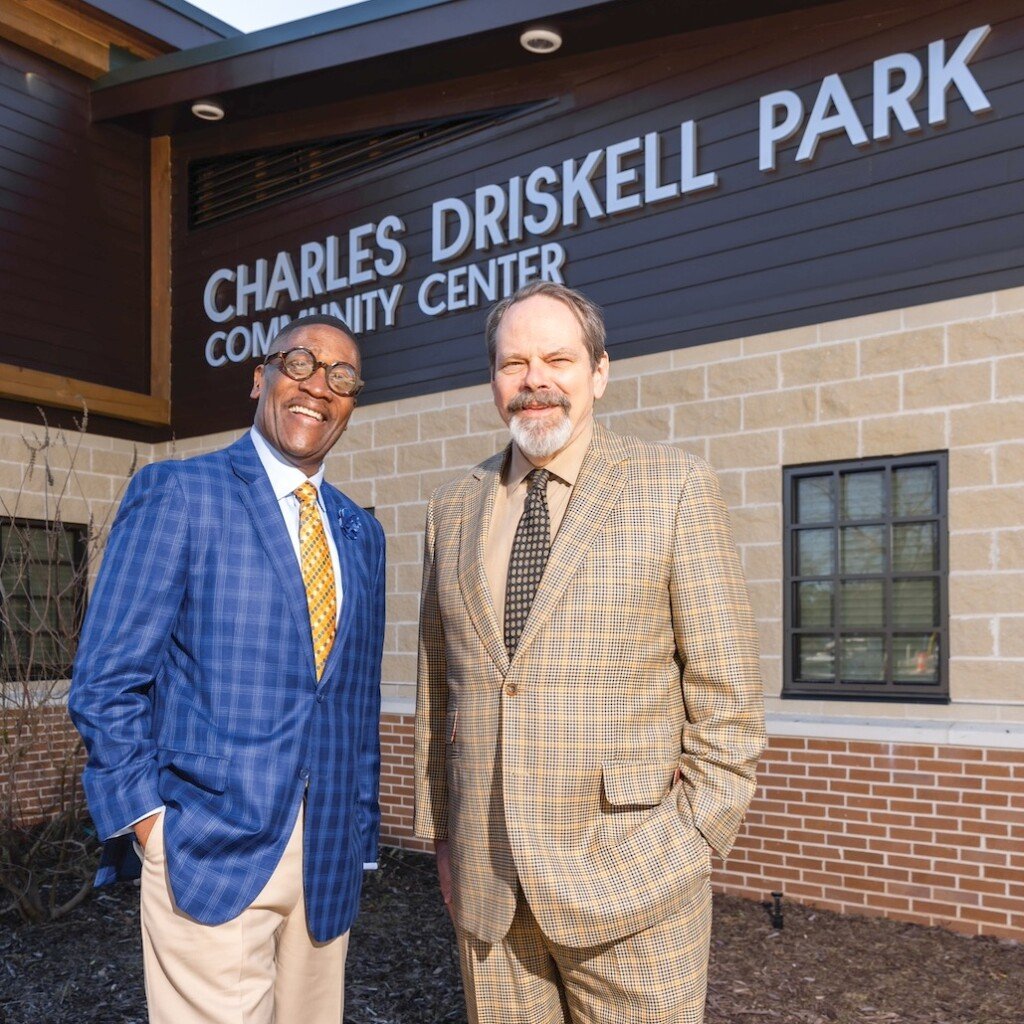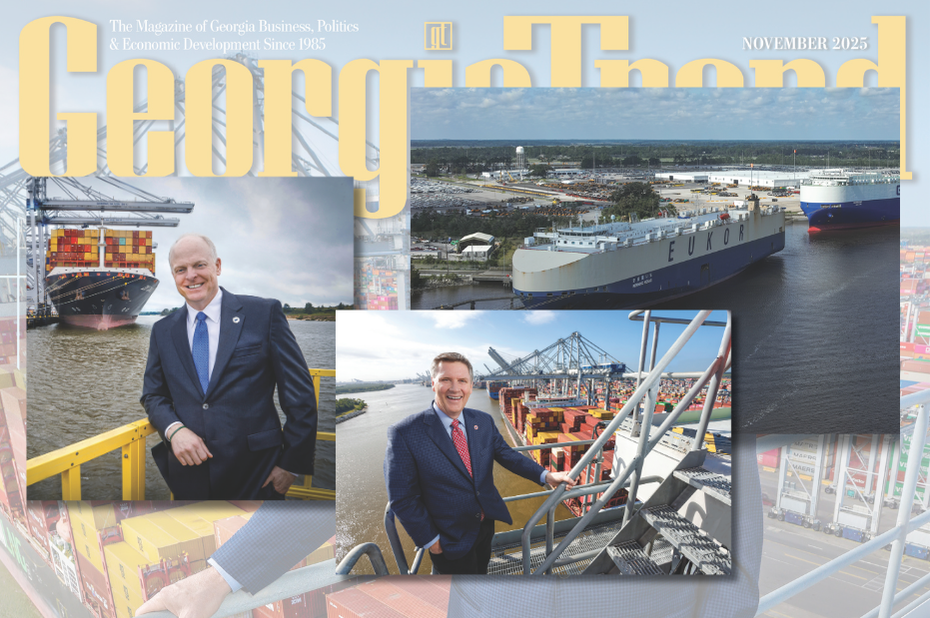Small Size, Big Values
Five Georgia companies that stand out.

For the Love of Flying: Maule Air President Brent Maule, by one of the planes his company built. Photo credit: David Parks
The U.S. experienced a post-COVID small business boom, and Georgia is helping to lead the surge. The U.S. Small Business Administration says it received a record 20 million applications for funding from entrepreneurs from 2021 to 2024 – the highest ever for any four-year period. That’s a critical part of the overall economy: The U.S. Chamber of Commerce reports America’s more than 33 million small businesses employ nearly half the workforce and represent 43.5% of GDP.
Georgia touts its ranking as the Top State for Business, conferred by Area Development magazine, and that means it offers an environment for small businesses to thrive. Lendio, a company that matches small businesses and lenders, ranks Georgia seventh as a great place for small businesses because it’s among the top states for approvals of small business loans and it had an influx of more than 80,000 workers in 2023.
Georgia defines its 1.3 million small businesses as independently owned and operated with fewer than 300 employees or bringing in less than $30 million in annual gross receipts. They’re the heart and soul of the state’s economy, according to the University of Georgia’s Small Business Development Center.
Five of those businesses have been named Georgia’s 2025 Small Business Rock Stars by the Georgia Department of Economic Development for their big dreams and shared commitment to Georgia, families and customer relations.
Up and Away
Maule Air
Moultrie • 26 employees

Family Business: Maule Air President Brent Maule, center, surrounded by the company’s employees. Photo credit: David Parks
Maule Air President Brent Maule chokes up when talking about his multigenerational family business.
“I’m proud of the fact that we’re still a family-owned business,” says Maule, whose fellow employees include his wife, mother, aunt, sister, brother-in-law, nephew and cousin. “We still all come to work together, and we’re keeping my grandparents’ legacy alive.”
Maule’s grandfather made his first plane at 19 using a converted motorcycle engine. By 1962, he’d designed and built the first of what are now legendary short take-off and landing (STOL) aircraft operating on every continent except Antarctica.
A Maule plane is known for its ability to take off and land where others cannot. It’s durable, has a long range and can carry heavy loads. Maule owners include bush pilots, commercial operators, flight schools, the military, law enforcement and other government operations. The planes are built-to-order and customizable with floats, skis or bush tires, and custom paint jobs and interiors.
“It’s for pilots that love flying, but it’s also for the ones that need a plane that’s going to work for them,” says Maule.
Maule’s grandfather moved his family and business from Michigan to Georgia in the late ’60s to take advantage of lower labor costs and better weather. Today, the “family” includes the owners of the 2,600 Maule airplanes in operation.
“It’s a tight-knit community,” says Maule. “When you call the factory, you can talk to a Maule family member. They love that about our airplane. We take care of our customers, and they take care of us. They might be able to find a similar part at another place, but they want to buy it from us because they want to support us.”
Maule Air offers three models – and is currently working on a new one – all built with the same components and able to accommodate one to five people. He says working with a new customer in Alaska to create a lightweight, heavy-load-bearing plane has helped the company return to its roots.
“Refining for that market has been a lot of work and a lot of fun,” he says. “It’s made our airplane really stand out from the others because you’ve got a certified airplane that will carry more than similar aircraft with more power, with more space, and it’s not experimental.”
“I’m wanting to expand,” says Maule. “I don’t want necessarily to be big like Boeing, but I want to be able to provide our product, expand upon that, and continue to improve and make it lighter, more capable and more utilitarian than it even already is.”
Art Underfoot
American Dakota
Calhoun • 3 full-time, 6 part-time employees

Exceeding Expectations: Mark Ford, American Dakota founder and designer. Photo credit: Kevin Garrett
American Dakota founder and designer Mark Ford wants you to live on his art. For 16 years, this small, wholesale rugmaker has been creating richly colored Southwest, cabin and modern designs that could adorn a wall as easily as the floor.
Ford draws inspiration from a wide variety of sources – the hammered metal of a light fixture, the side of a freshwater trout, vintage shirts, a cowboy boot.
“My heart is in the West,” says Ford. “We’re always pushing the envelope on what we can do. We don’t just want to rehash a tired motif over and over again.”
Ford is also deeply committed to partnerships with Native American artists with whom he splits his profits 50/50.
“I’ll never begrudge writing a big check to a Native American artist,” says Ford. “It delights me. They’re able to reap the benefits of their hard work, and that can live beyond just one piece.”
While Ford grew up in Northwest Georgia’s carpet region, he never imagined he’d own a company that ships rugs all around the country and the world.
“I swore when I got out of college, I was going to get a real job and I wasn’t going to be in the textile business,” says Ford. “Lo and behold, the planets aligned and I’m designing rugs for a living.”
American Dakota’s made-to-order rugs are milled from EnduraStran nylon, known for its durability, ease of cleaning, fade-resistance and antimicrobial properties. Ford works with a local mill, sources all of his materials domestically and sells through dealers and online retailers like Cabela’s and Wayfair.
Ford started American Dakota with his wife Simone toward the end of the Great Recession and says the early years were lean. He always answered the phone – and still does – and he took orders on napkins. He has raised prices only twice in 15 years (to cover rising petroleum prices), and his company has grown steadily since.
“We do what we say we’re going to do, which is deliver every time,” says Ford. “And we’re never out of stock.”
Ford is about to offer a new product he’s excited about – commercial-grade rug “planks” that emulate wood grain and can be mixed and matched into infinite designs. Ford calls the new Woodland Collection “a beast of a product” suitable for hotels and ski lodges with “severe” traffic.
“We strive to delight and exceed our customers’ expectations,” says Ford. “It’s our goal to make people proud to own and display our products.”
Liquid Gold
Woodpecker Trail Olive Farm
Glennville • 2 full-time, 60 seasonal employees
If you’re searching for some of the best olive oil in the world, look no further than Woodpecker Tree Olive Farm in Southeast Georgia. Tracy and Curtis Poling planted their first trees just 10 years ago, produced their first harvest in 2019 and won a Silver Award for their first press at the 2020 NYIOOC World Olive Oil Competition, the world’s premiere olive oil quality contest. One reviewer called their extra virgin olive oil “truly one of the best olives oils I have ever examined from the United States.”

Pride in their Product: Curtis and Tracy Poling, owners of Woodpecker Trail Olive Farm. Photo credit: Michelle Meadows, For His Glory Art and Photography LLC
The Polings inherited their 300-acre, sixth-generation farm in Tattnall County from Tracy’s family. Curtis had worked in international business development and began researching what to do with the farm. He learned that Spanish settlers in Coastal Georgia had planted olives starting in the 1600s, but the crop was devastated by the Civil War. His interest piqued, he sent off a soil sample for testing. The result: The farm could support olives.
“We just jumped in and did it,” says Curtis. They ordered 6,000 trees and today have 10,000 trees of 11 varietals on 14 acres with plans to add 30 to 50 more acres. He says last year they produced 1,500 gallons of oil. “I expect to double out this year and keep going. It’s addictive. It gets in your blood.”
The farm sits along Highway 121, the historic Woodpecker Trail, in what Curtis calls a microclimate. A little further north, it’s too cold; a little further south, too hot.
“This is where the Mediterranean meets Georgia, right here,” says Curtis. “We’re really lucky to have this climate.”
The Polings manage their farm themselves 364 days a year. On harvest day – that’s just a single day in September – they bring in seasonal workers to handpick the olives and rush them off to a nearby mill. They bottle the oil themselves, market it to gourmet specialty shops and ship 90% of their oil direct to consumers.
The Polings take pride in the health qualities of their oil – an average polyphenol content of 388. Oils with a count of 250 or higher are considered high in these anti-inflammatory antioxidants.
“Everybody has realized the health benefits of olive oil,” says Tracy. “We have people who drive hours just to restock.”
The Polings say their biggest challenge is keeping up with demand, but it’s a challenge they’re happy to take on.
“There’s a gratification in putting this tree in the ground and producing something that people enjoy,” says Curtis. “That’s the best part of it.”
Essential Parts
Evans Tool & Die
Conyers • 70 employees

Excellent Reputation: Dee Barnes, president and CEO of Evans Tool & Die. Photo credit: Kevin Garrett
For more than 75 years, Evans Tool & Die has been making metal parts for products that wouldn’t be of much use without them – seatbacks for golf carts or handles for fire extinguishers. They’ve also made laparoscopic tubes for surgery and a roach separator for the reptile feed industry.
Third-generation President and CEO Dee Barnes says they’re in 21 different industries, from refrigeration and electrical to firearms and fire prevention and can turn out a thousand parts or a million.
“Just about anything you can think of with stamp metal parts, we can create it,” says Barnes.
In an age when many manufacturers have moved overseas, Barnes takes pride in being a family-owned business with long-term customers going back as many as 60 years.
“We’ve always had a reputation in the industry of excellent work and products,” she says.
Barnes says they also offer supply chain security – a big issue these days.
“You can come here, you can see your die, you can see your tool,” says Barnes. “You always know you’re going to get your product. It doesn’t take six months.”
Over the years, Evans has added metal stamping and laser fabrication divisions and plans to add a structural I-beam line this year. The company has added robotics but continues to offer five-year apprenticeships.
“You can never replace that skill of a toolmaker,” says Barnes.
Barnes says they’re guided by four values – integrity, accountability, excellence and generosity. That generosity, says Barnes, “starts with our employees.”
There are bonuses, quarterly gift giveaways and events like bowling, bingo and ice cream. Generosity extends to the community with support for nonprofits, volunteering, even “adopting” 40 families last Christmas. Barnes says these events help bring the Evans “family” of employees together and create loyalty.
“I still have some 30- and 40-year employees here,” says Barnes. “Our oldest employee currently is 82. We’re committed to our employees, and they’re committed to us. It makes for a great legacy.”
It’s a legacy she hopes to pass on to the next generation.
“We’ve been approached many times to buy us out, and we don’t want to do that,” says Barnes. “We see [a family-owned business] as a real value to the community, to industry in this country, and also to our employees and their families. It’s not all about making money.”
Feed for Farmers
Godfrey’s Feed
Madison • 45 employees
Cows don’t get snow days, and neither does Weyman Hunt, sixth-generation CEO and owner of Godfrey’s Feed. So when snow shut down roads in January and left the operation with a skeleton crew, Hunt was at the Morgan County mill mixing feed, loading trucks and preparing for the next day. “The cows don’t stop eating,” he says. “We’ve got a responsibility to our customers and our industry to make sure that feed is there and on time.”
Godfrey’s has been a fixture in the Madison agricultural community since the 1870s, guided by what Hunt calls its core values – honesty and integrity.
“We’re in the commodity business and everybody’s got the same set of ingredients,” says Hunt. “At the end of the day, it’s all about customer service and doing what we say we’re going to do. We’ve always just tried to treat people like we want to be treated and give advice like we’d want.”
Hunt says they deliver feed to farmers from Florida to Indiana. They work with consulting nutritionists to create formulations based on what the client needs, not, he says, based on what they have. And because the family also raises Hereford cattle, Hunt says they can apply their own real-world experience.

Prioritizing Customers: Godfrey’s Feed has been a fixture in the Madison agricultural community since the 1870s. Photo credit: Contributed
“If you’re having health problems or feed problems,” says Hunt, “we’ve probably been there too and have got some good ideas on how you might be able to resolve some of that stuff. We try to talk to people and explain what their options are so that they can make informed decisions and do what’s best for them.”
Hunt says his father and uncle were always available to talk to customers, and he continues that level of service.
“We’re big enough to buy in bulk and create good bargains or good value for our customers,” he says. “But we’re also small enough that if there’s a problem, you can talk to me, and we’re going to get it fixed.”
Hunt says in an operation with so many moving parts, every day brings a new challenge – snow, broken equipment, a wrecked truck. His goal is to fix it and move on.
“If you don’t love this,” he says, “you better not be in it because like I said, we have deadlines to meet every day.” 







